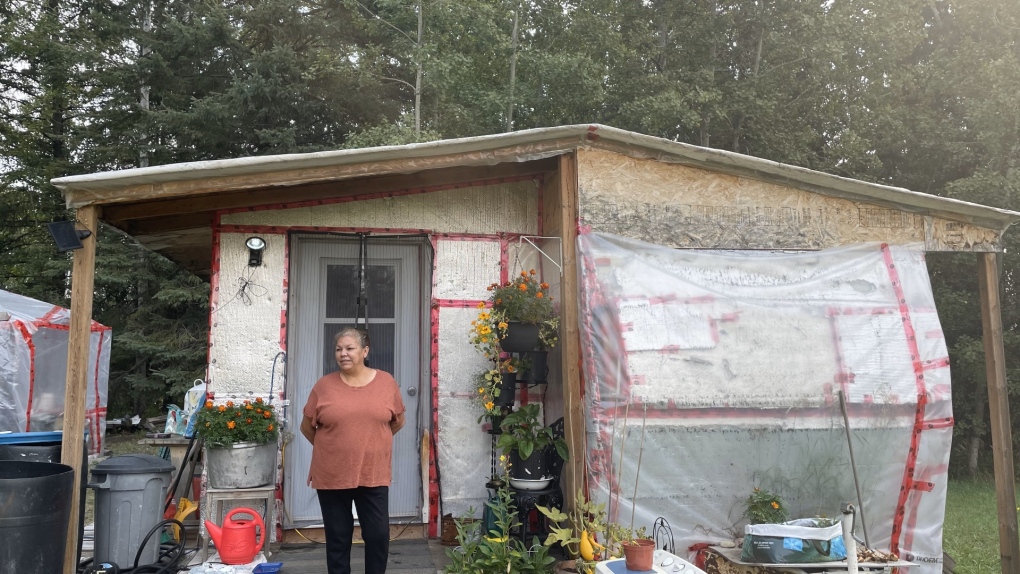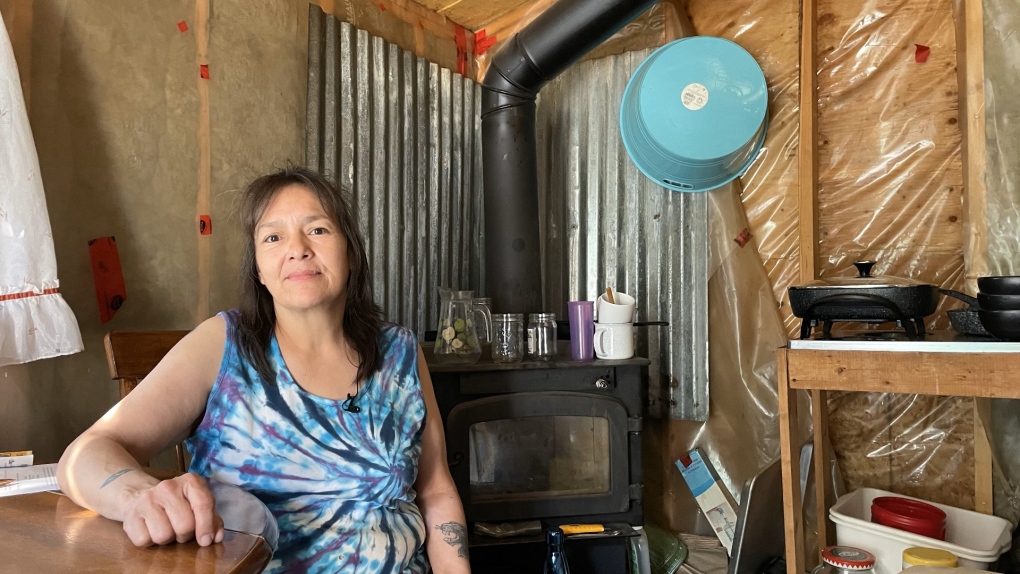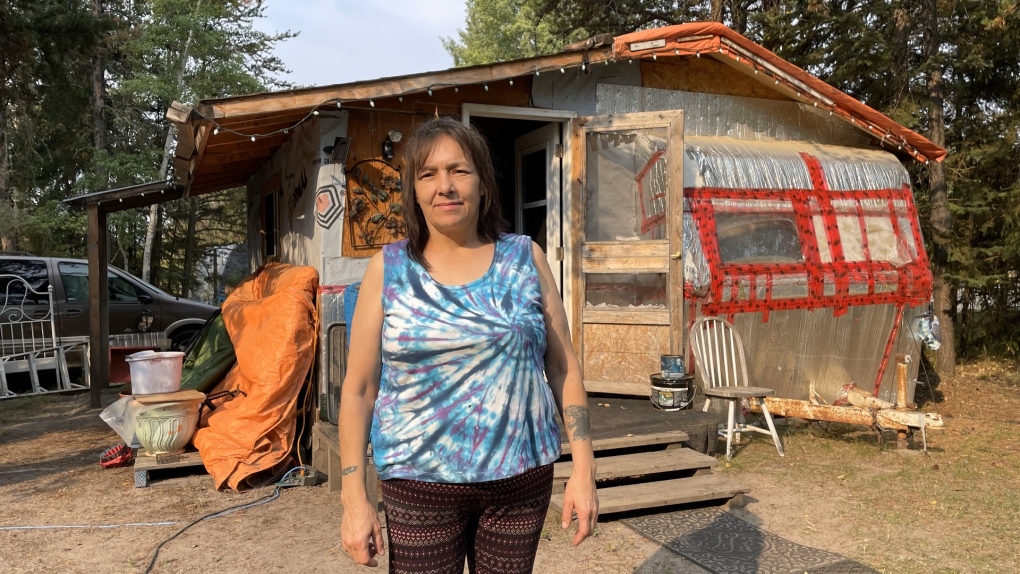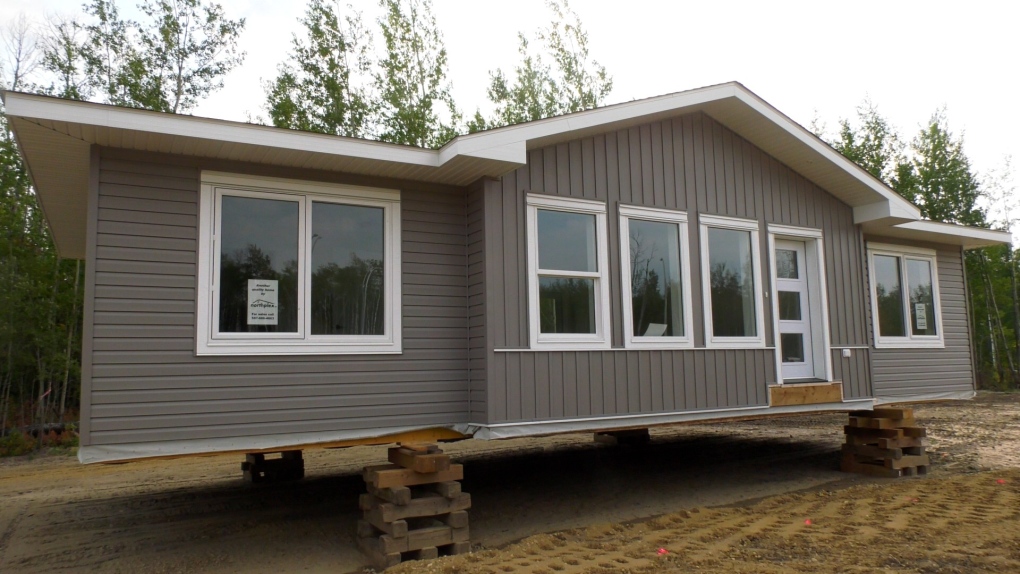Northern Alberta Indigenous community receives new homes amid housing crisis
Sitting outside the small, modified RV camper she's called home for eight years, all Grace Richards can think about is the first hot shower she'll soon be able to take in her new home.
Richards is set to move into one of the homes being built in her community through Cenovus Energy's Indigenous Housing Initiative, a $50-million plan to build 200 homes in communities near their operations in Northern Alberta.
Grace and her sister, Darlene Richards, will be among the first to move into the new homes built in partnership with the Conklin Métis, a small community about 350 kilometres northeast of Edmonton.
"It is cozy, but it's very hard living. Yes, very hard living. Especially the winter months," Grace said of her current home.
"We look forward to the spring, the warmer weather, being able to stay at home. Because in the winter months, we run away from the cold into somebody else's home for the night or something," she told CTV News.
 Both Grace (pictured) and Darlene have been living in separate RVs that do not have running water or direct power, constructed with a patchwork of do-it-yourself siding and insulation.
Both Grace (pictured) and Darlene have been living in separate RVs that do not have running water or direct power, constructed with a patchwork of do-it-yourself siding and insulation.
Both Grace and Darlene have been living in separate RVs that do not have running water or direct power, constructed with a patchwork of do-it-yourself siding and insulation.
They run power through extension cords from their neighbours and heat water on propane-powered stoves they've installed in the plywood kitchens they've added to the sides of their RVs.
Their future homes were pre-built near Lloydminster and recently transported to the new subdivision in Conklin with an anticipated move-in next month.
"I'm excited. Like, this (RV home) has been nice to me but, I mean, it'd be nice to have running water and lights," Darlene said.
"I survived here but it's really in rough shape."
 Both Grace and Darlene (pictured) have been living in separate RVs that do not have running water or direct power, constructed with a patchwork of do-it-yourself siding and insulation.
Both Grace and Darlene (pictured) have been living in separate RVs that do not have running water or direct power, constructed with a patchwork of do-it-yourself siding and insulation.
Announced in 2020, Cenovus pledged $10 million each year for five years to partner with six First Nations and Métis communities to address overcrowding and homelessness.
According to the company, 160 homes will be completed by the end of 2024.
"It means people will get out of the, you could say, poverty situations that they are currently living in and live in more standard living with running water with proper heating," said Valerie Quintal, president of Conklin Métis Local 193 and a member of the housing committee in the community.
"Housing is always an issue, but (Cenovus) identified what was needed or what the situation looked like at that time and offered to help us," she added.
 Both Grace and Darlene (pictured) have been living in separate RVs that do not have running water or direct power, constructed with a patchwork of do-it-yourself siding and insulation.
Both Grace and Darlene (pictured) have been living in separate RVs that do not have running water or direct power, constructed with a patchwork of do-it-yourself siding and insulation.
$135 billion needed to close housing gap: report
In its Closing the Infrastructure Gap 2030 report, the Assembly of First Nations found more than 157,000 new homes need to be built to address the housing crisis in Canada's Indigenous communities.
The report from the AFN, released earlier this year, determined funding from the federal government would need to exceed $135 billion to address overcrowding and homelessness on First Nations.
The most recent data from Statistics Canada, released in 2021, shows one in six Indigenous people are living in crowded homes "considered not suitable for the number of people who lived there."
That's more than double Canada's non-Indigenous population.
StatCan also found 16 per cent of Indigenous people live in a home in need of major repairs.
"That was something that I learned when I moved out here and moved into a place like this," Grace Richards said.
"The things that I took for granted was coming home and being able to turn on a light switch, being able to have a shower every day, the running water, being able to do my dishes every day, having a fridge, a stove to cook."
 Cenovus Energy's Indigenous Housing Initiative is a $50-million plan to build 200 homes in communities near their operations in Northern Alberta.
Cenovus Energy's Indigenous Housing Initiative is a $50-million plan to build 200 homes in communities near their operations in Northern Alberta.
In addition to the homes in Conklin, the Cenovus program has partnered with communities to build housing on Beaver Lake Cree Nation, Chard Métis Nation, Chipewyan Prairie Dene First Nation, Cold Lake First Nations and Heart Lake First Nation.
CTVNews.ca Top Stories

Trudeau appears unwilling to expand proposed rebate, despite pressure to include seniors
Prime Minister Justin Trudeau does not appear willing to budge on his plan to send a $250 rebate to 'hardworking Canadians,' despite pressure from the opposition to give the money to seniors and people who are not able to work.
'Mayday!': New details emerge after Boeing plane makes emergency landing at Mirabel airport
New details suggest that there were communication issues between the pilots of a charter flight and the control tower at Montreal's Mirabel airport when a Boeing 737 made an emergency landing on Wednesday.
Cucumbers sold in Ontario, other provinces recalled over possible salmonella contamination
A U.S. company is recalling cucumbers sold in Ontario and other Canadian provinces due to possible salmonella contamination.
Trudeau says no question incoming U.S. president Trump is serious on tariff threat
Prime Minister Justin Trudeau says incoming U.S. president Donald Trump's threats on tariffs should be taken seriously.
Latest updates: Tracking RSV, influenza, COVID-19 in Canada
As the country heads into the worst time of year for respiratory infections, the Canadian respiratory virus surveillance report tracks how prevalent certain viruses are each week and how the trends are changing week to week.
Weekend weather: Parts of Canada could see up to 50 centimetres of snow, wind chills of -40
Winter is less than a month away, but parts of Canada are already projected to see winter-like weather.
Atlantic hurricane season comes to an end, leaving widespread damage in its wake in U.S.
The 2024 Atlantic hurricane season comes to a close Saturday, bringing to an end a season that saw 11 hurricanes compared to the average seven.
Armed men in speedboats make off with women and children when a migrants' dinghy deflates off Libya
Armed men in two speedboats took off with women and children after a rubber dinghy carrying some 112 migrants seeking to cross the Mediterranean Sea started deflating off Libya's coast, a humanitarian aid group said Friday.
Federal government posts $13B deficit in first half of the fiscal year
The Finance Department says the federal deficit was $13 billion between April and September.


































